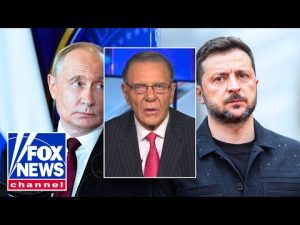In a surprising twist of events, it seems that President Trump’s diplomatic efforts are taking center stage in the political arena. A recent poll shows that his approval ratings have jumped a notable four points since last month, landing at a solid 54%. This surge in support comes on the heels of his much-discussed summit with Russian President Vladimir Putin, where things appeared to go quite well for the former president. Independent voters and a whopping 92% of Republicans are expressing their approval, suggesting that his peace agenda is winning over many who might have been skeptical in the past.
As President Trump held court in the Oval Office, world leaders—including representatives from France, Germany, the United Kingdom, Italy, Finland, Ukraine, NATO, and the European Commission—gathered around him. This scene contrasted sharply with earlier perceptions of Trump as an outsider in the political sphere. Once dismissed and even ridiculed by some European leaders, Trump now seems to be stepping up as the uncontested leader on the world stage, guiding discussions on pressing global concerns and making his mark as a peacemaker in turbulent times.
The evolution of Trump’s foreign policy is noteworthy. Seven peace agreements are under his belt now, and he appears to be seen as a vital player in negotiating an end to the ongoing conflict in Ukraine. This is a major turnaround from the challenges he faced during his first term, when many world leaders showed reluctance to engage with him at all. As European leaders begin to recognize his capability and leadership, it seems they are more than willing to support his efforts in seeking peace. This shift demonstrates a newfound respect for the U.S. leadership, painting an optimistic picture of Trump’s effects on international relations.
Looking back, one can’t help but remember the perceived missteps during the administrations of Joe Biden and Barack Obama. Under Biden, America’s global standing felt shaky, marked by his stumbling speeches and awkward public appearances. Comparatively, Trump’s straightforward and confident approach contrasts sharply with the former president’s apology tour. The previous leaders’ attempts to appease allies sometimes resulted in lost respect, leaving many Americans pining for a stronger United States on the international stage.
Meanwhile, the media coverage surrounding Trump’s diplomatic efforts remains a contentious issue. Critics from the left seem unwilling to acknowledge his progress, often twisting narratives to paint a negative picture of his initiatives. Reports of European leaders rushing to Washington were met with skepticism, suggesting that they were primarily seeking to pressure Trump rather than outright support him. Many in conservative circles view this as a blatant attempt by the media to undermine any success Trump might achieve in his peace endeavors, arguing that such efforts should be applauded rather than criticized.
At the end of the day, the developments that have arisen from Trump’s recent diplomatic engagements have fostered an optimistic outlook for broader peace discussions. With significant moves being made by both the U.S. and Russian leaders, including a tentative openness from Putin to meet with Ukrainian President Zelenskyy, the possibility of progress seems more tangible than ever. In the eyes of many supporters, this is a testament to Trump’s peacemaking abilities. It’s certainly a fascinating time in politics, as Trump’s leadership has sparked renewed conversations about America’s role in the world—an endeavor that is both chaotic and inspiring.







